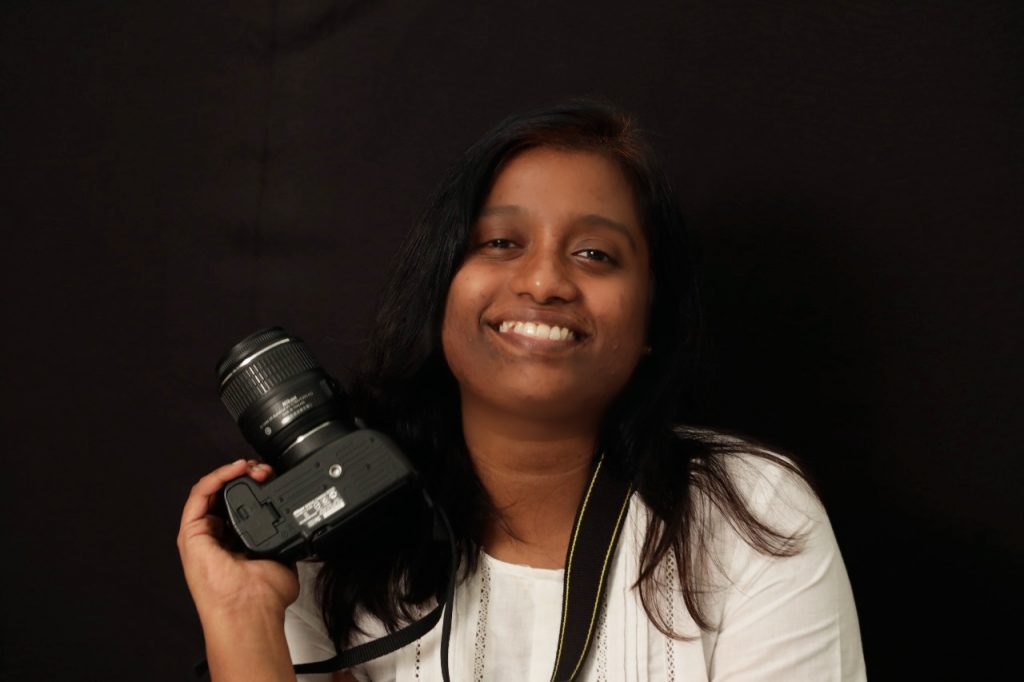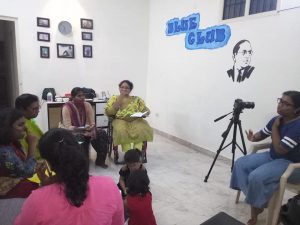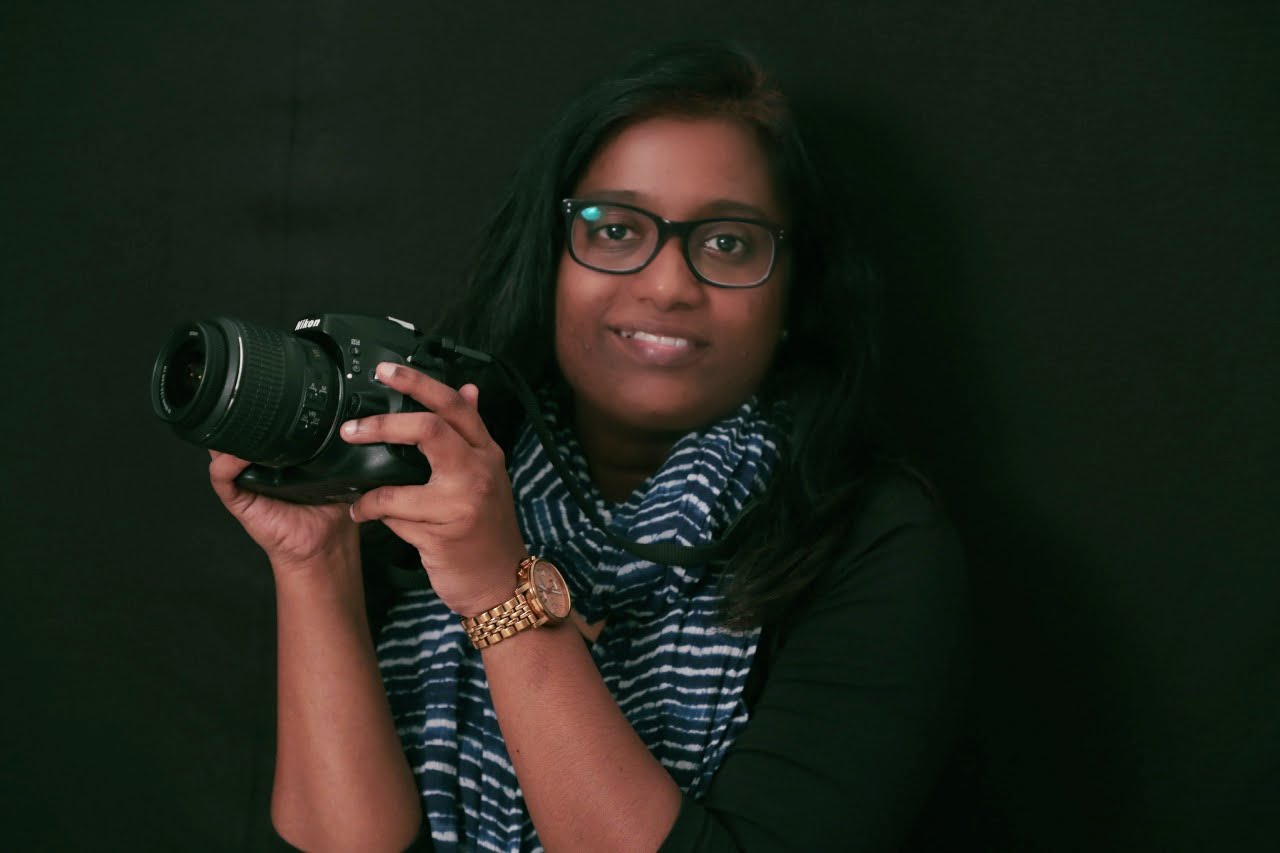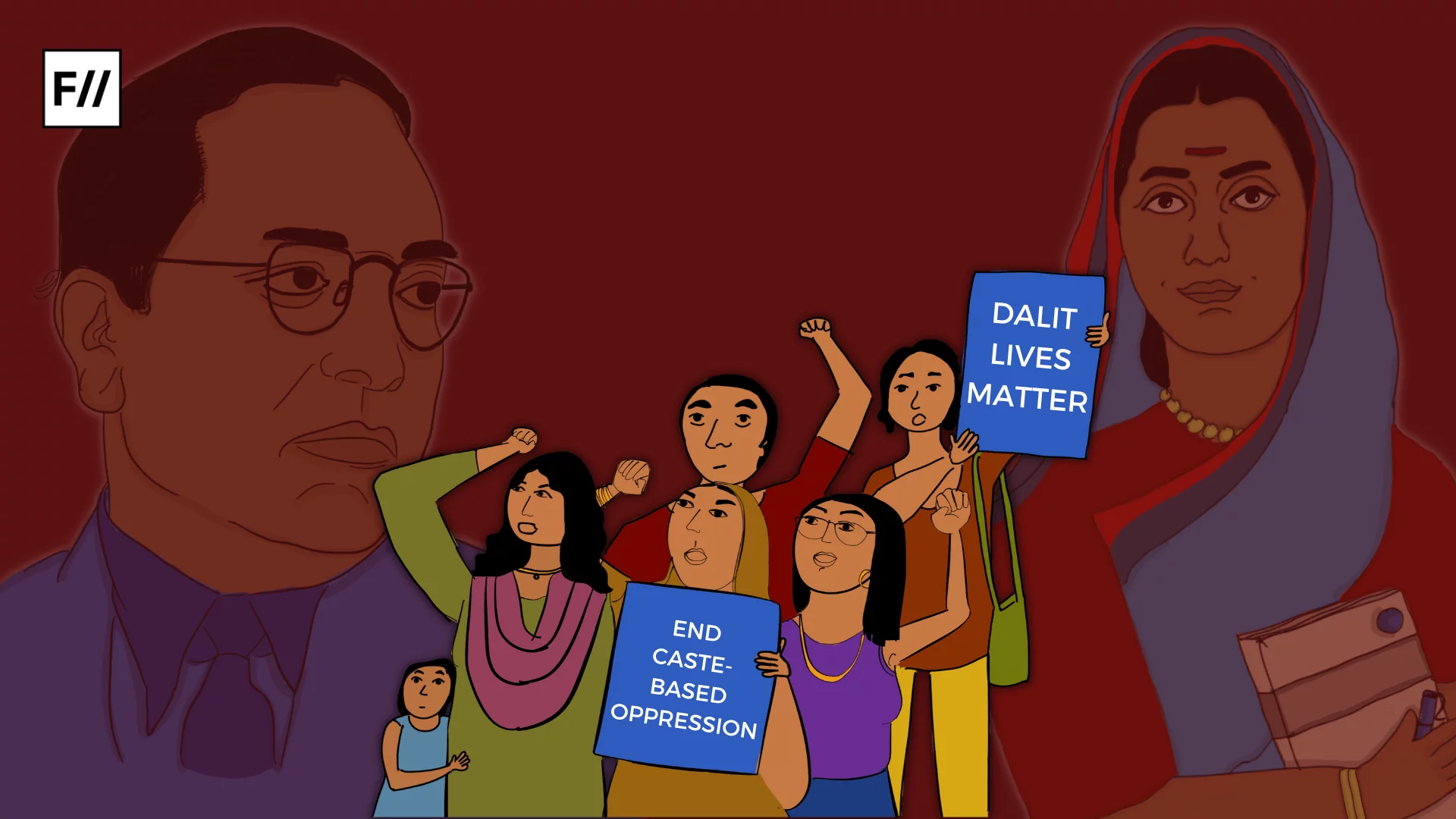Priyadharsini is an independent filmmaker. She graduated from the Asian College of Journalism and is also an aeronautical engineer. Having worked with several media outlets, including India Today, she now does independent filmmaking full-time. She is also a guest lecturer at the Quaide-Milleth International Academy of Media Studies (QIAMS).

Priyadharsini
The Blue Club, run by Priyadharsini, is committed to magnifying Dalit women’s voices and provides filmmaking mentorship. We had the opportunity to interview Priyadharsini about her Club, her films and Dalit women’s movement.
Hamsadhwani Alagarsamy: What was the idea behind The Blue Club? Is there any particular incident that prompted you to start it?
Priyadharsini: I’ve been trying very hard to make commercial films but it’s extremely difficult for women in Tamil Nadu to get into filmmaking. Most film sets in India are a horror story for women – they’re filled with men and there is no space for us to voice our ideas or opinions in any way. If I do get the opportunity to make a commercial movie, I’d still not have complete freedom over how it is made, I wouldn’t be able to make it properly feminist, because I will ultimately have to listen to my producers and what they’d want is for the movie to appeal to the masses because that’s how they can make money.
Even if I do end up making radical, real-time feminist movies, I’d get wiped out from the industry in 5-10 years. And then a few years later another woman who wants to do something similar would come up and the same would happen to her. So I thought, “How do I make sure women last in the industry? How do I make sure more women are properly equipped to make it past everything the industry throws at them?” That’s what led me to start The Blue Club.
We provide a space for female directors to get their stories out by helping with visually documenting them. I mean there are unions for female directors or assistant directors but they’re more focused on rallying. I wanted to create a space where woman with experience in the field could help other young women with learning the technicalities of filmmaking, because there are very few opportunities for women, especially the ones from marginalised communities, to learn it.
HA: What are the activities The Blue Club is involved in?
PD: The main activity of The Blue Club is to make space for women to come together and share their stories, to share important aspects of each other’s lives. We watch a lot of international films with regional language translations and later discuss these films. Mostly the films we select are written/directed by female directors and/or has female protagonists. I feel that a major part of my learning came from my experiences through travelling. But for women that do not have the time or means to travel, watching such films is an eye-opening experience.
Dalit women there face harassment and abuse not just from the men, but also the upper caste women.
We then discuss scripts with each other and sit together to write them. We work with the women to help them understand the technical aspects of it like the camera, lighting, etc. Ultimately, we create short films and documentaries that are written and directed by the women on their own. It becomes a life-changing experience for the women when they see themselves as the directors of films.
Although it’s not just us teaching them, I learn so much from their experiences too. These women are fighters and are incredibly intelligent. It was lovely how our interactions were two-way processes. We learnt something of immense value from each other. So we decided to just roll the camera while we sat down and talked as usual. That’s how the videos that you see on our Facebook page which is one of the activities we’re involved in, came about.
HA: The interviews The Blue Club conducts are rich with previously unexplored dimensions of Dalit women’s lives. What do you think are the most important insights to be gained from these stories?
PD: Caste is rarely ever explored from a feminist lens. When these women talk about their lives, it is groundbreaking in it that it destroys the way people view caste in society. These women undergo twofold oppression owing to the fact that they’re part of the intersection of two oppressed communities. Their perspective is invaluable and only can be provided by Dalit women.
Also read: In Conversation With Dalit Camera: Eradicating The Dominant Savarna Lens In Media
Also, Dalit women have the least value in our system. They are at the lowest rungs of our society. Anyone watching our videos will understand how deplorable such a reality is. These women are warriors. They go to work, earn a livelihood, come home to finish their household chores, and still have the strength and compassion to bring the best out of their children.

Image Source: Facebook
Another mind-blowing thing I’ve noticed about every single Dalit woman I have interviewed is that they care tremendously about education. They would go to the ends of the world to make sure their children have access to education. This is true even for women who have never stepped foot in a school.
HA: Popular media definitely lacks in a nuanced representation of Dalit women, if there is representation at all. What is your take on it, and how do you think they could do better?
PD: There is definitely misrepresentation in the media. In my opinion, don’t represent us at all if you don’t want to put in any effort into doing it properly and truthfully. Leave us alone and we’ll be better off than when you represent us as uncivil sub-humans. The popular media are the main reason for the societal perception of us as rude, aggressive, and dirty.
My mother cannot stand the use of even the smallest swear words around her. My aunt is one of the most compassionate human beings I’ve ever met. The ‘Dalit women’ you see on the big screens are not who we really are.
Besides, most movies are made by upper caste men and most of the women they represent are women from their own communities. They do a terrible job at representing even them properly. So how can they be trusted to represent women from other, less privileged communities?
The only solution to this is getting women behind the camera and making them wield the pens. I cannot emphasise enough on the need for this. A good example of that is the impact lyricist Uma Devi has already started having on Tamil songs. She writes in Naan Nee, a song from the movie Madras,
Naan paravaiyin vaanam
Pazhagida vaa vaa neeyum(I am the sky
You can come fly if you like)
Uma Devi is essentially saying that the woman is the sky, the constant. The man is the bird, temporary and soaring in the sky only because the woman is benevolent enough to let him. It’s beautiful, I love that line. I get goosebumps whenever I listen to or read Uma Devi’s lyrics.
Many directors are attempting to write female characters and feminist scripts but they usually fail. Unless women are involved with the writing of the story itself, no justice is done to the characters portrayed.
HA: Who is the team behind The Blue Club? What are the logistics involved?
PD: We’re majorly a flexible team. Except for Vasanth, our editor, who is a journalism student at Loyola College, all of us are not present all the time. But the important people behind The Blue Club are Gowtham Meena, Valli, Olga Aaron – a trans woman who’s been with us from the beginning, Aishwarya – a disabled people’s rights activist who’s essentially our mentor, and Revathi – a student who’s made a film about honour killings and the blatant casteism underlying it.
HA: Do you think the ongoing #MeToo movement is inclusive of Dalit women’s voices? Is the Indian feminist movement, in general, doing enough for women belonging to marginalised communities?
PD: It was extremely disappointing to have feminists like Kavita Krishnan actively engage in the erasure of Dalit women’s voices during the #MeToo movement. What happened to Raya Sarkar was saddening as well.
Unless women themselves are involved with the writing of the story itself, no justice is done to the characters portrayed.
Besides, Dalit women face difficulties every day on a regular basis. Their survival is inherently not devoid of struggle. In cities, most of them work in spaces which are highly dangerous. They are recruited by contractors and left at the mercy of upper caste employers. There is no plausible legal respite for them in such cases. In rural regions, Dalit women are made to fear for their lives every second, when they are out on the fields, when their daughter has to cross the upper caste settlement on her way to school, everywhere.
They need to be constantly careful and alert. But most of us don’t have the platforms to speak out about it. My mother works at a government office and these are some of the worst places for Dalit women. All the people in high positions are upper caste people. Dalit women there face harassment and abuse not just from the men, but also the upper caste women. Gowthama Meena in her interview to The Blue Club has spoken about how she had to start an employees’ union to fight against such an abusive environment.
So that question that remains is this: if you are picking and choosing what sort of oppression you are going to fight against, while you actively benefit from one form yourself, are you really fighting oppression?
What upper caste women need to understand is that they have much more in common with underprivileged women – biologically, socially and emotionally – than they have with men of their own caste. They need to choose sisterhood over the benefits they get from casteist power structures, for their own benefit in the long run if not out of the goodness of their hearts.
HA: A significant amount of online spaces in the West are taken up by marginalised communities and used for sharing their experiences, activism, and mobilisation. Do you see India doing the same soon?
PD: Well, I definitely hope to see that, because there are several wonderful and efficient platforms online.
There have already been many YouTube channels like the Dalit Camera that focus on caste issues. On an individual level too many youngsters have found their own spaces on the internet. They are writing blogs and making videos about their lifestyles and their experiences. In fact, even the whole #MeToo movement happened because of social media. I can only imagine what having more marginalised women take up spaces would bring about.
HA: Are there any other projects you are involved in?
PD: I have made films like Go, Get Education, a short film based on the life of Savitribai Phule, a revolutionary 19th century feminist social reformer, and #dalitwomenfight which is on the rape atrocities committed on Dalit women in Haryana. I worked along with the All India Dalit Mahila Adhikar Manch (AIDMAM) on this and the film was screened at the United Nations Human Rights Council. I also actively shoot news that the media is not focusing on.
I intend to have a network of women around India covering these issues. Every region in India should have its own network of women that is actively covering issues and uploading it online. So far we have managed to establish one such network in South India. We are looking to expand this network in the next few years.
HA: What’s next for The Blue Club?
PD: Right now, we are looking to cover 100 stories of Dalit women. We also want to train at least 10 to 20 women from each region in India to take up filmmaking.
Also read: Ladai Seekh Le! Ambedkarite Sumeet Samos Is Transforming Indian Hip-Hop
FII thanks Priyadharshini for taking out time to do the interview. Follow The Blue Club’s work on Facebook and subscribe to their YouTube channel.
About the author(s)
Hamsadhwani is a law student and anti-caste socialist feminist. Abolish the conditions that produce the prison.




